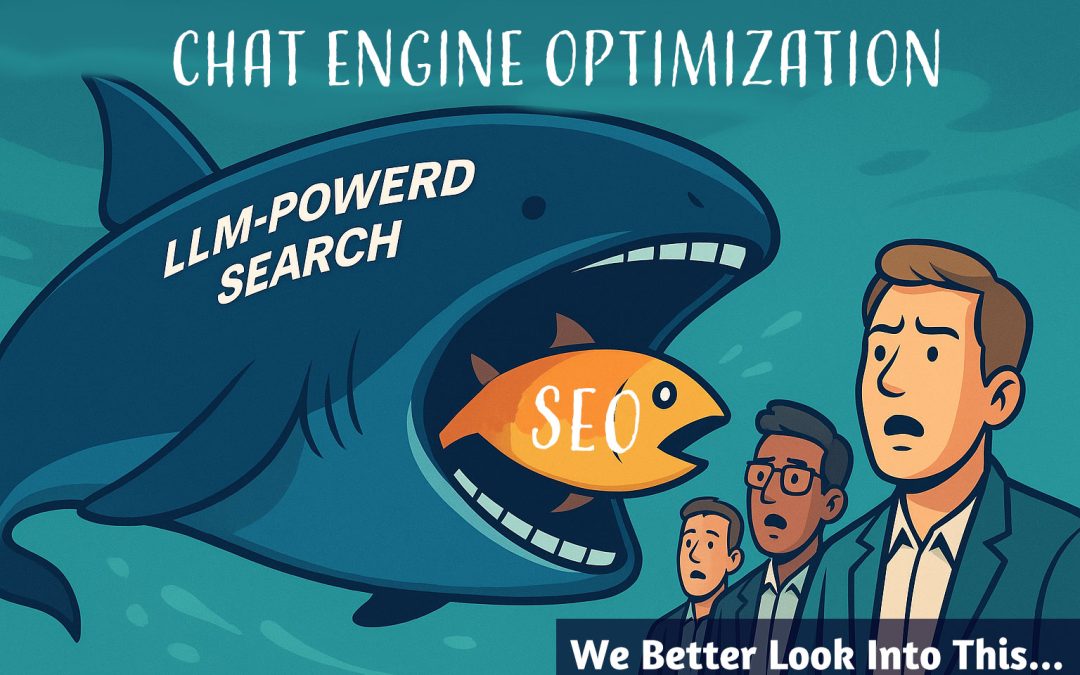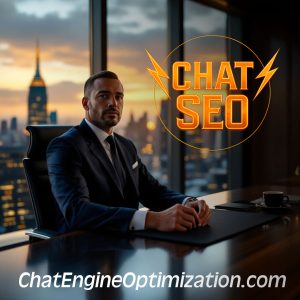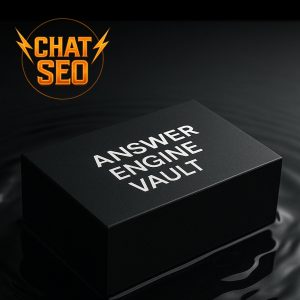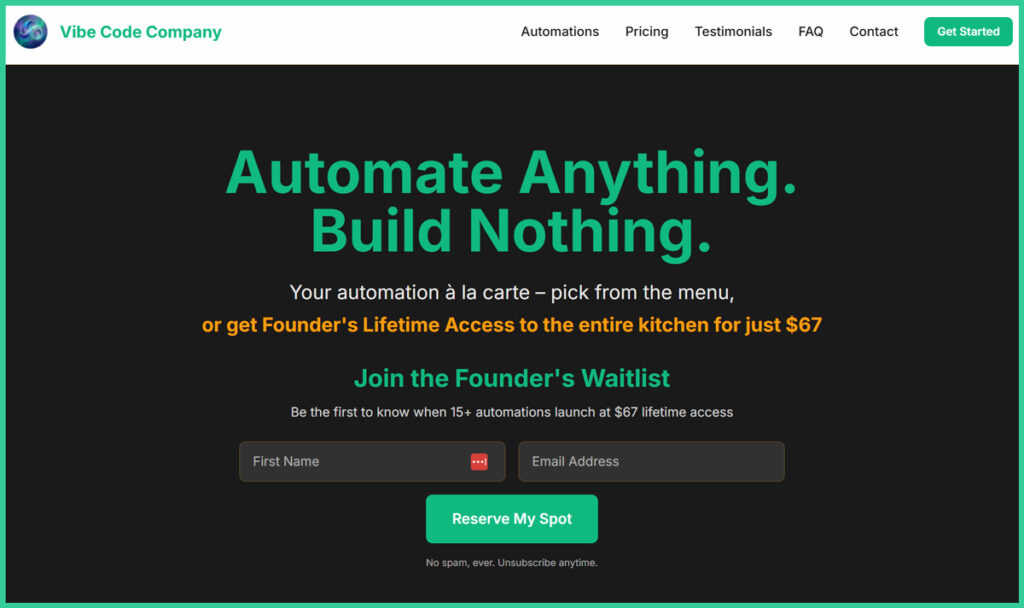How To Optimize Content For Chat Engine Optimization [CEO]
Page Contents
- How To Optimize Content For Chat Engine Optimization [CEO]
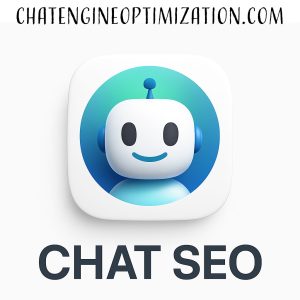 “Chat Engine Optimization Is Achieved through the SEO Stack App and is a form-driven AI content visibility application. The SEO Stack App ingests structured data about a business, product, or creator, and outputs a clear list of media optimization tasks, schema suggestions, authoritative link targets, and content formatting guidelines – all designed to enhance discoverability by LLMs and chat interfaces.”
“Chat Engine Optimization Is Achieved through the SEO Stack App and is a form-driven AI content visibility application. The SEO Stack App ingests structured data about a business, product, or creator, and outputs a clear list of media optimization tasks, schema suggestions, authoritative link targets, and content formatting guidelines – all designed to enhance discoverability by LLMs and chat interfaces.”
Are you tapping into the full potential of chat engine optimization for your content’s visibility on generative AI chat models like ChatGPT?
As marketers and content creators thrive in the digital age, a new frontier known as Chat Engine Optimization (CEO) emerges. Unlike traditional Search Engine Optimization (SEO), CEO emphasizes optimizing content for the conversational contexts within AI-driven platforms.
Understanding the intricate differences between SEO and CEO is crucial for staying ahead. While SEO focuses on pleasing search engines, CEO centers on engaging users in AI-powered chat environments, marking its growing importance in digital marketing strategies. Marketers need to craft content that speaks to authenticity, authority, and reader engagement.
This article will guide you through optimizing content for CEO. We’ll cover key aspects such as creating high-quality content, structuring text for AI, and leveraging emerging strategies. Dive in to discover how mastering CEO can enhance your brand’s online presence and authority in an AI-driven world.
Understanding Chat Engine Optimization (CEO)
Chat Engine Optimization (CEO) is an emerging field focusing on optimizing content for AI-driven platforms like ChatGPT. Unlike traditional search engines, these platforms process conversational queries, requiring content structured for AI comprehension. In CEO, establishing your content’s validity and credibility is crucial. This involves becoming a go-to source for generative engines, ensuring they regularly refer to your content in user interactions. Backend optimization and online credibility strategies are key, aiming to bolster your brand’s authority and trustworthiness in digital spaces. As AI-driven interactions grow, CEO becomes essential for maintaining online visibility and relevance.
Differences Between SEO and CEO
While SEO focuses on enhancing visibility in traditional search engines, CEO prioritizes AI-driven environments. Traditional SEO hinges on factors like keywords and backlinks. However, CEO extends beyond these tactics to optimize content specifically for AI-generated search results. In CEO, there’s a need to engage users conversationally, aligning with how they interact with AI platforms. Despite these differences, SEO and CEO share a foundational goal: creating quality content that meets user intent. By understanding and implementing both strategies, businesses can ensure they effectively target both conventional and AI-driven search landscapes.
Importance of CEO in Digital Marketing
CEO is gaining traction as a crucial component of digital marketing in the era of generative AI tools. As platforms like ChatGPT become more prevalent, organizations must optimize their content to be recognized as experts by these tools. This shift is reshaping how brands approach digital marketing, necessitating a strong online presence and reputable social media engagement. Successfully implementing CEO strategies enhances visibility in AI-generated responses, complementing traditional SEO efforts. As AI-driven interactions become more integral to consumer behaviors, companies excelling in CEO are better poised to adapt and thrive in this evolving landscape.
Key Factors for Effective CEO
AI-powered search engines, such as Google’s Gemini and OpenAI’s ChatGPT, are transforming how users interact with content, necessitating a shift in optimization strategies. Effective CEO (Chat Engine Optimization) ensures your content remains visible in these AI-driven search environments. Traditional methods like maintaining high rankings in search engine results are crucial as AI-driven search systems often pull data from top-ranked sources. Additionally, incorporating clear, succinct sections such as FAQs can enhance your chances of being featured in AI-generated responses. This form of content not only supports user intent but also facilitates efficient information extraction and presentation by AI platforms.
High-Quality Content Creation
Producing high-quality content is vital for successful SEO in AI-driven landscapes. Tools like ChatGPT can aid in planning by identifying trending topics and structuring them into clusters, creating a strategic content roadmap. Repurposing existing content into new formats, such as transforming case studies into press releases, broadens distribution and enhances brand visibility. Implementing schema and structured data ensures that your content is easily recognizable and extractable by AI, especially on support and tutorial pages. Focusing on entities – specific topics, people, or places – ensures accurate AI representation, thus reinforcing your brand’s authority and aligning with Generative Engine Optimization (GEO) strategies.
Authenticity and Authority (E-E-A-T)
The E-E-A-T principle – experience, expertise, authoritativeness, and trustworthiness – is indispensable for boosting your site’s visibility and brand credibility. Establishing trust involves citing credible sources, maintaining a professional design, and ensuring content accuracy. Positive brand mentions and customer testimonials are essential badges of credibility that AI models like ChatGPT value when evaluating content sources. Crafting high-quality, relevant content that meets user needs aligns with E-E-A-T, further optimizing performance in AI searches. By adhering to these principles, your content becomes more engaging, authoritative, and trustworthy, which is critical for effective Chat Engine Optimization.
Importance of Clean and Structured Text
Clean and structured text is critical for AI systems as they often truncate long content that fails to meet tight time constraints. AI crawlers function more effectively with content formatted in plain HTML or markdown, as they may struggle with JavaScript. Using well-structured headers and subtitles enhances content comprehension, allowing AI platforms to interpret brand information accurately. A logical content structure with clear headings and concise organization ensures that AI engines can efficiently digest and potentially feature your content. Headings and subheadings also facilitate language models’ understanding, improving the relevancy and accuracy of AI-generated responses.
Role of Metadata and Semantic Markup
Metadata and semantic markup are crucial components of SEO, enhancing a website’s visibility and user engagement by providing context to AI and search engines. Well-structured pages with semantic markup and schema are easier for AI systems to crawl, parse, and summarize, thus benefiting Generative Engine Optimization (GEO) efforts. Optimized metadata improves click-through rates (CTR) by generating engaging, keyword-rich headlines. Meta descriptions and titles, when aligned with targeted keywords, enhance discoverability across various search platforms, including AI-driven systems. Employing semantic markup is a best practice that boosts overall search performance by making content more contextually relevant to AI algorithms.
Structuring Content for AI
AI-powered search engines are revolutionizing how we access information. Platforms like ChatGPT, Claude, and Grok rely on large language models to provide responses that align with natural language queries. For content to be effective in this ecosystem, it must prioritize clarity, engagement, and relevance. This approach ensures that content is aligned with AI’s requirement for precise attribution and quotability, key factors in visibility and effectiveness.
Strategic Content Layout
A well-organized content layout enhances both user experience and AI understanding. By using hierarchical headings, you can improve readability and help AI-powered tools like ChatGPT process your content more efficiently. Keywords should be strategically incorporated in headings, introductions, and metadata to increase chances of being referenced. Comprehensive content that avoids filler is vital to serving as a reliable resource for AI, showcasing your content as a valuable asset.
Enhancing AI Visibility
Generating visibility on AI-driven platforms involves more than traditional SEO tactics. GEO optimization targets AI specifically, ensuring content is mentioned often, exists in diverse formats, and has a positive sentiment. AI engines emphasize content based on its validity, not just rankings, highlighting the importance of substantiated information. Implementing web accessibility features further aids AI understanding, reinforcing content’s prominence in this new search landscape.
Ensuring Easy Text Extraction
A fast, efficient website is crucial for AI to extract information. Optimizing site speed and resolving technical issues fosters effective AI interaction. Clearly structured content using headings, bullets, and concise paragraphs enhances the ability of AI to skim and extract essential points. Proper HTML use, such as H1 and H2 tags and metatags, clarifies content for AI crawlers. Integrating schema markup, including FAQ schema, further refines AI text extraction, ensuring your content is easily accessible.
Optimizing Website Architecture
A well-structured website is essential for both user satisfaction and search engine performance. Implementing clean and efficient code, alongside responsive design principles, not only enhances user experience but also increases search engine visibility. Central to this is creating a clear hierarchy with effective internal linking, which simplifies the process for search engines to crawl and index pages efficiently. Transitioning from keyword-focused structures to context-driven content is crucial for AI-generated queries. Tools like Google Search Console are invaluable for identifying and addressing structural issues. Additionally, quality backlinks and a mobile-friendly design are critical elements that contribute to a robust website that supports SEO optimization.
Seamless Crawling for AI Models
AI models require well-organized and clean data input to optimize crawling and processing capabilities. Providing clean HTML or markdown versions of your site’s documentation ensures seamless AI crawling. Furthermore, a well-structured XML sitemap prioritizing critical URLs, supported by a logical site architecture, enhances the crawlability of your content by AI models. Documenting internal links and minimizing orphan pages are also vital for enhancing AI navigation and content comprehension. Ultimately, improving site speed and mobile-friendliness are key to providing both AI models and users with an optimal experience. Proper configurations of robots.txt files and canonical tags are necessary to control AI access and prevent issues related to duplicate content.
Even without specific guidelines, we understand that efficient navigation is crucial to the user experience and search engine optimization. A website that allows users to easily find information increases engagement and reduces bounce rates. Efficient navigation ensures users have seamless access to all parts of a website, directly impacting satisfaction and the likelihood of returning. While it may not be explicitly outlined, efficient navigation undoubtedly enhances the way both users and search engines interact with site content, further promoting visibility and accessibility across the web.
Leveraging Tools for CEO
Answer Engine Optimization (AEO) is reshaping how content is discovered on AI-driven platforms like ChatGPT and Gemini. Unlike traditional SEO, GEO focuses more on platforms that utilize AI-driven search engines. AEO, CEO, GEO and SEO share fundamental strategies such as creating quality content and understanding user intent. Optimizing content for AI interactions involves methods akin to voice search strategies, which are crucial for increasing visibility across AI tools.
As AI chat tools grow, leveraging advanced technologies like SEO Stack App AI agents becomes essential. These tools help enhance GEO efforts by improving content alignment with AI-driven search engines. Market trends, including the rise of users on platforms like ChatGPT in 2023, signify a shift in content optimization standards. Tools like these ensure content is not only visible but also engaging to AI platforms.
SEO Multi-Page Information Tool
An SEO Multi-Page Information Tool is vital for optimizing each webpage to improve search rankings and draw targeted traffic. These tools help businesses create SEO-friendly content by refining elements such as headings and keywords. As AI models gain prominence, these tools are adapting to Generative Engine Optimization (GEO), ensuring content visibility on AI-focused platforms like ChatGPT.
By automating repetitive tasks such as title tag updates and content variant creation, these tools boost efficiency. They also support businesses in aligning their content with user intent, a crucial aspect shared by both traditional SEO and GEO. The evolution of these tools reflects the ongoing integration of AI in content optimization, assisting businesses to stay competitive in a rapidly changing digital landscape.
Single Page Analyzer
The Single Page Analyzer provides an in-depth evaluation of essential SEO metrics – crucial for web page optimization. It measures metrics like heading levels, word count, and reading level, flagging them in red or blue if they deviate from good practice standards. This tool is invaluable for SEOs who need to optimize content effectively.
Users can input a specific URL into the Single Page Analyzer to assess the page’s SEO performance. The outcomes guide SEOs in making necessary content changes to enhance web visibility. Frequent tool usage allows for iterative testing, leading to continuous improvement in web page performance.
The insights gained from using the Single Page Analyzer facilitate informed decisions about content adjustments. This tool’s reports act as a vital resource in establishing an effective SEO strategy. By utilizing these insights, SEOs can better cater to both traditional and AI-driven search engines, ensuring comprehensive optimization.
Emerging Strategies for Content Engine Optimization (CEO) Success
In the evolving digital landscape, CEOs must harness AI-driven search engines to maintain and enhance their companies’ online presence. The integration of AI into search functionalities, such as Google’s AI Mode and Gemini, requires an optimization strategy that balances traditional SEO with AI Answer Engines. CEOs must ensure their content ranks well on search engines while being adequately prepared for AI-driven platforms. This dual approach enables companies to capture the foreground in both classic and cutting-edge digital searching.
AI Overviews boost visibility and combat declining click-through rates, making it essential to optimize for AI summaries. CEO roles now include strategizing for these shifts by leveraging AI technologies like Bing and ChatGPT. Ensuring content quality and authority can increase the chances of being featured in these influential overviews. As AI increasingly dictates search results, staying ahead means optimizing for both AI and traditional search engines simultaneously, thus securing both immediate and long-term visibility for the brand.
Storytelling for Brand Engagement
Storytelling is a pivotal tool for brand engagement, allowing marketers to transform factual content into compelling narratives. By weaving values and emotions into stories, brands create deeper connections with audiences, often surpassing the impact of straightforward promotion. This technique resonates with audiences on an emotional level, making the brand’s identity more relatable and memorable.
Crafting stories also enables brands to utilize nuanced social interactions, which can forge lasting impressions. For instance, sharing customer testimonials or behind-the-scenes stories humanizes the brand, fostering loyalty. Through storytelling, brands not only deliver their message effectively but also enhance consumer interaction, ensuring sustained engagement.
Successful storytelling bridges the gap between data and emotion, creating enriched experiences. By cultivating narratives that reflect the brand’s ethos and values, organizations can influence audience perception positively and drive brand loyalty. This method not only differentiates the brand in a crowded market but also strengthens its emotional connection with its audience.
Building Brand Authority
To build brand authority, companies must adopt Generative Engine Optimization (GEO) early, positioning themselves as thought leaders. This proactive approach allows brands to mold their reputation in an environment increasingly dominated by AI. Optimization for AI platforms is crucial, as it ensures precise representation in AI-synthesized outputs. By doing so, brands can reinforce their credibility and influence across digital formats.
Emphasizing structured, authoritative content is key to enhancing brand authority. Highlighting specific entities such as topics, people, and places in content boosts a brand’s visibility within AI-driven platforms. This strategy leverages AI technology to improve a brand’s authoritative standing, making it a trusted information source across various sectors.
Furthermore, content that is rich in context naturally establishes brands as reliable industry sources. Particularly in specialized areas like healthcare, detailed and accurate information builds trust among consumers. As AI continues to shape how users interact with content, a strategic emphasis on accuracy and depth can fortify a brand’s authoritative position, first encountered through AI and then confirmed by users through traditional searches.
Understanding AI Ranking Signals
AI ranking signals play a pivotal role in how content is assessed and displayed on search engines. AI systems prioritize content that is accessible and easy to navigate. This means using clean HTML or markdown and ensuring well-structured pages are imperative. AI-powered search places emphasis on things like brand mentions, strategic keyword usage, and the relevancy of information. By understanding these elements, you can improve content visibility significantly.
Generative AI engines score content based on relevance, shifting traditional SEO practices. This involves letting AI crawlers read your site by adjusting robots.txt and firewall rules. Well-structured pages help AI bots crawl and retrieve pertinent information efficiently. This enhances generative search outcomes, redefining the landscape of content optimization and ranking.
Importance of Programmatic Access via APIs
APIs are vital for ensuring that your content is readily accessible by AI tools, enhancing distribution and discoverability. By providing programmatic access through APIs or RSS feeds, content can be more efficiently processed, utilized, and distributed. Using OpenAPI specifications standardizes these interactions, allowing AI tools to process your content seamlessly.
Programmatic access facilitates dynamic and real-time integration of content into AI-driven platforms. This not only improves the freshness and relevance of your data in AI responses but also aids in scalable content syndication. With APIs, you can reach broader audiences across multiple platforms, significantly boosting engagement and interaction.
Keeping Content Fresh and Relevant
To keep content fresh and relevant, personalization is key. AI tailors responses based on user context, such as their location and behavior, to deliver content that resonates deeply with audiences. By analyzing referral traffic from chat-based interactions, you gain insights into user interests, helping refine content strategies.
Anticipating user queries with a comprehensive FAQ section can greatly enhance content engagement and relevance. Utilize data-driven insights to improve your content strategy, ensuring your material resonates with your audience. Structuring your content using an inverted pyramid style makes it easier for AI tools to extract information, keeping your content both fresh and frequently cited. This strategic approach enhances the overall user experience, ensuring your website remains competitive in the AI-driven landscape.
Frequently Asked Questions:
FAQ: Chat Engine Optimization
Q: Is Chat Engine Optimization replacing SEO?
A: No, it’s complementing it. Traditional SEO still matters for web visibility, but CEO is becoming essential for conversational discovery.
Q: How do I know if my brand is being referenced by AI engines?
A: Tools like Profound or SEOStackApp can monitor mentions and citation frequency within AI answers and bot logs.
Q: What type of content works best for Chat Engine Optimization?
A: Structured guides, FAQs, product comparisons, definitions, and how-to content formatted for quick parsing and semantic clarity.
Q: Should I change my website structure?
A: You may not need a full redesign, but consider adding schema-marked sections, bot-friendly markdown pages, and clean URLs.
Q: Do images and media matter for CEO?
A: Not as much. Bots prioritize text, structure, and metadata. Ensure images have alt text and captions, but focus on the written content.
Why Trust WebSuite Media?
With over 20 years of hands-on experience in the digital marketing and SEO industry, WebSuite Media has consistently delivered real-world results for clients across a wide spectrum of industries. Our long-standing presence reflects a deep understanding of evolving algorithms, consumer behavior, and emerging technologies in the digital space.
We don’t just teach SEO – we live it. Every campaign, site, and optimization strategy we implement is grounded in firsthand experience gained over decades.
What Sets Us Apart:
- Proven SEO Expertise: Successfully optimized various websites for local, national, and global rankings.
- 20+ Years of Digital Marketing Experience: From the dawn of Google Ads to today’s AI-powered search, we’ve been there.
- Diverse Portfolio: From small business websites to enterprise eCommerce platforms, we’ve done it all.
- Technical SEO Capabilities: Advanced audits, structured data, Core Web Vitals, and schema optimization.
- Content Strategy & Execution: Creating keyword-rich, high-authority content aligned with Google’s E-E-A-T standards.
- Voice & AI SEO: Pioneering modern techniques to increase visibility in AI-powered search engines like ChatGPT, Gemini, Amazon and Perplexity.
Our commitment to quality, transparency, and client growth has earned us the trust of businesses nationwide.
Whether you’re launching a new site, recovering from an algorithm hit, or optimizing for chat engine visibility, WebSuite Media is the partner businesses trust for real SEO success.

